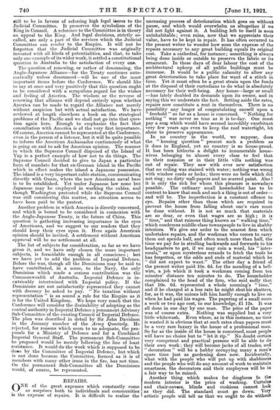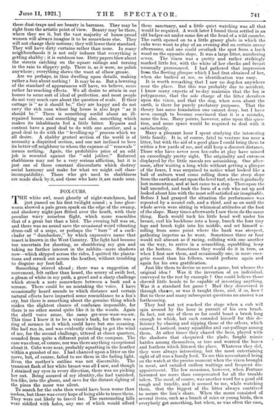REPAIRS.
ONEof the great expenses which constantly come as surprises both to individuals and communities is the expense of repairs. It is difficult to realize the unceasing process of deterioration which goes on without pause, and which would overwhelm us altogether if we did not fight against it. A building left to itself is soon uninhabitable ; even ruins, now that we appreciate their value, have to be kept in repair. It has often occurred to the present writer to wonder how soon the expense of the repairs necessary to any great building equals its original cost. Take a cathedral, for instance; something is always being done inside or outside to preserve the fabric or its ornament. In these days of dear labour the cost of the architectural upkeep of all public buildings must be immense. It would be a public calamity to allow any great deterioration to take place for want of a stitch in time. Yet it must often be a great strain upon the funds at the disposal of their custodians to do what is absolutely necessary for their well-being. Any house large or small —has lately doubled its demands upon its owner, and in saying this we understate the fact. Setting aside the rates, repairs now constitute a rent in themselves. There is no possibility any longer of congratulating oneself upon a " freehold " so far as a house is concerned. " Nothing for nothing " was never so true as it is to-day. One must pay a aura which would have seemed incredibly exorbitant very few years ago even to keep the roof watertight, let alone to preserve appearances. In no country in the world, we suppose, does the " housing question " present such a problem as it does in England, yet no country is so house-proud. It has been hitherto a delight to innumerable house- wives belonging to almost every class to feel that in their mansion or in their little villa nothing was out of repair. They saw with ever new satisfaction that no ceiling was stained with water ; nothing was wrong with window cords or locks ; there were no bells which did not ring ; no dirty wall-papers and no scarred paint. Alas 1 it is only the rich for whom this pleasure is nowadays possible. The ordinary small householder has to be content to know that such and such a thing is out of order— and will be. The imperfection is a constant offence to eye. Repairs other than those which are required to prevent the house from falling about one's ears must be done without. It is not so much that materials are so dear, or even that wages are so high ; it is " time," and that ruinous thing known as " walking time," which condemns middle-class townspeople to live in shabby interiors. We give our order to the nearest firm which undertakes repairs, and the workman who comes to carry them out spends half, and often much more than half, the time we pay for in strolling backwards and forwards to his headquarters to get, if we may coin a word, his " inter- meals," or upon mysterious errands to fetch the tools he has forgotten, or the odds and ends of material which he " did not expect to want." The other day a friend of the present writer paid 10s. 6d. for the mending of a bell- wire, a job which it took a workman coming from ten minutes' distance ten minutes to do. The householder complained to the head of the firm, who said sadly that that 10s. 6d. represented a whole morning's " time," and if he charged at a less rate he might shut his shutters, for, as it was, the unions left him hardly enough to live on when he had paid his wages. The papering of a small room a week or two ago cost, to our knowledge, £1 12s. It was all done in one day by one man. The price of the paper was of course extra. Nothing was supplied but a very little whitewash. Even where, as in this instance, no time is wasted it is obvious that at such rates clean papers must be a very rare luxury in the house of a professional man. So far as the inside of the house is concerned, most people will have no choice but to " let it rip." No doubt certain very competent and practical persons will be able to do their own work ; they will become jacks of all trades, and " decoration " will be a hobby occupying many a man's spare time just as gardening does now. Incidentally, what with the people who will put up with shabbiness and the people who will do any amount of work to maintain smartness, the decorators and their employees will be in a fair way to be ruined. Another thing which makes for dinginess in the modern interior is the price of washing. Curtains and chair-covers, blinds and cushions cannot look as they did. The standard must go down. Very artistic people will tell us that we ought to do without these dust-traps and see beauty in bareness. They may be right from the artistic point of view. Beauty may be there, where they see it, but the vast majority of house-proud women will always imagine it to be somewhere else. They will not change their notions; they will lower their standard. They will have dirty curtains rather than none. In many neighbourhoods it is not only indoors that everything is getting shabby ; it is outdoors too. Dirty papers blow about the streets catching on the square railings and turning in the rain to slippery pulp. There is, as it were, no polish anywhere ; everything shows the want of elbow grease. Are we perhaps, in thus dwelling upon details, making rather a fuss about nothing ? It may be so. But a lowering of the standard of appearances will have, we believe, some rather far-reaching effects. We all desire to attain in our homes to some sort of ideal of perfection, and most people do not very much care about the question of scale. If their cottage is as it should be," they are happy and do not envy the rich man whose big house is also kept " as it should be." There is something sordid about an ill- repaired house, and something sad also, something which makes its inhabitants feel a little bitter. Repairs and content have a good deal to do with one another, and a good deal to do with the " levelling-up " process which we all desire. A shabby genteel section of the world is of necessity a dispirited section, and one not inclined to love its better-off neighbour to whom the expense of " renewals " means nothing. Again, the prohibitive price of an odd job is resented against the " odd jobber." Enforced shabbiness may not be a very serious affliction, but it is just one of those constant discomforts which destroy social harmony and make for what we might call class- incompatibility. Those who get used to shabbiness are made slack by it, and those who hate it are made sour.



































 Previous page
Previous page